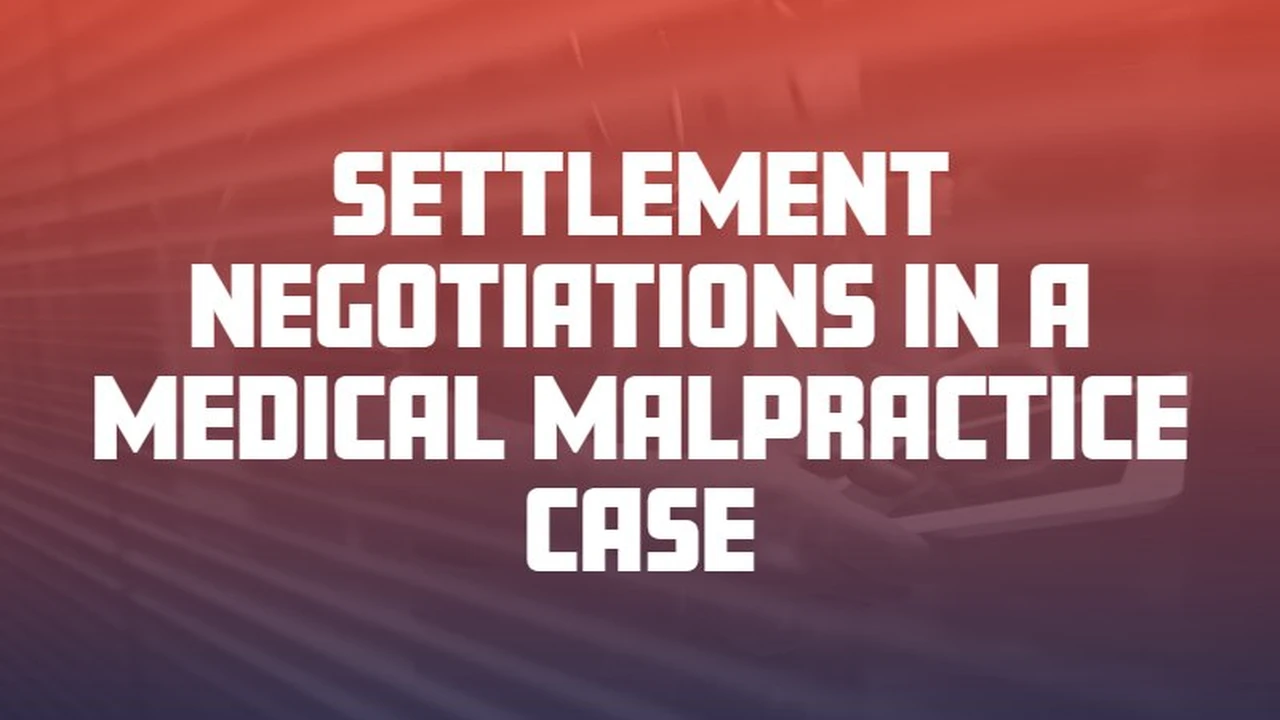Calculating Medical Malpractice Settlement
How personal injury lawyers determine the potential settlement value in medical malpractice cases.

How personal injury lawyers determine the potential settlement value in medical malpractice cases.
Calculating Medical Malpractice Settlement
Navigating the aftermath of medical malpractice can be incredibly challenging. Beyond the physical and emotional toll, there's the daunting task of understanding your legal options and, crucially, what your case might be worth. When you've suffered harm due to a healthcare provider's negligence, one of the most pressing questions is often: "How much compensation can I expect?" This isn't a simple question with a straightforward answer, as medical malpractice settlements are complex and depend on a multitude of factors. However, understanding the components that go into calculating these settlements can provide clarity and help you set realistic expectations.
Personal injury lawyers, especially those specializing in medical malpractice, play a pivotal role in this process. They don't just pull a number out of thin air; instead, they meticulously evaluate every aspect of your case to arrive at a fair and comprehensive valuation. This involves assessing various types of damages, understanding legal precedents, and often engaging with a network of experts. Let's break down how these experienced legal professionals approach the calculation of a medical malpractice settlement.
Understanding Damages in Medical Malpractice Cases
When we talk about a medical malpractice settlement, we're essentially talking about compensation for the 'damages' you've suffered. These damages are broadly categorized into two main types: economic damages and non-economic damages. In some rare cases, punitive damages might also be awarded, though these are less common in medical malpractice.
Economic Damages Medical Malpractice Financial Losses
Economic damages are the most straightforward to calculate because they represent quantifiable financial losses. These are the 'receipts' of your suffering, so to speak. A skilled medical malpractice attorney will meticulously gather all documentation to support these claims. Here's what typically falls under economic damages:
- Medical Expenses: This is often the largest component. It includes all past medical bills directly related to the malpractice, such as hospital stays, surgeries, doctor visits, medications, rehabilitation, and therapy. Crucially, it also includes projected future medical expenses. If you'll need ongoing care, future surgeries, or long-term therapy, your attorney will work with medical experts to estimate these costs over your lifetime. This can involve complex calculations, especially for conditions requiring lifelong care.
- Lost Wages and Loss of Earning Capacity: If the medical malpractice caused you to miss work, you can claim compensation for past lost wages. More significantly, if your injury has permanently affected your ability to work or earn at the same level as before, you can claim for 'loss of earning capacity.' This involves projecting your lost income over your entire working life, taking into account potential promotions, raises, and benefits. Economists and vocational experts are often brought in to provide expert testimony on these projections.
- Out-of-Pocket Expenses: This category covers a wide range of other costs you've incurred due to the malpractice. Think about transportation costs to medical appointments, the cost of modifying your home or vehicle to accommodate a disability, assistive devices (wheelchairs, prosthetics), and even the cost of hiring help for household tasks you can no longer perform.
Non-Economic Damages Pain Suffering Emotional Distress
Non-economic damages are more subjective and, therefore, more challenging to quantify. They represent the non-financial impacts of the malpractice on your life. While there isn't a direct bill for these, they are often a significant part of a medical malpractice settlement. These include:
- Pain and Suffering: This is compensation for the physical pain you've endured and will continue to endure. It's not just about the initial pain but also chronic pain, discomfort, and the overall impact on your physical well-being.
- Emotional Distress: Medical malpractice can lead to severe emotional and psychological trauma. This includes anxiety, depression, PTSD, fear, anger, and loss of enjoyment of life. Therapy and counseling records can help substantiate these claims.
- Loss of Enjoyment of Life: If your injuries prevent you from participating in hobbies, activities, or social events you once enjoyed, you can seek compensation for this loss. This could be anything from playing sports to gardening, traveling, or spending quality time with family.
- Loss of Consortium: This type of damage applies to the spouse of the injured party. It compensates for the loss of companionship, affection, intimacy, and support that the injured spouse can no longer provide due to the malpractice.
- Disfigurement and Scarring: If the malpractice resulted in permanent disfigurement or significant scarring, this can also be a component of non-economic damages, reflecting the emotional and psychological impact of these physical changes.
Calculating non-economic damages often involves using multipliers or per diem methods, though these are just starting points. The ultimate value is determined by the severity of the injury, its long-term impact, and the persuasive arguments made by your attorney.
Punitive Damages Gross Negligence Malice
Punitive damages are rarely awarded in medical malpractice cases. Unlike economic and non-economic damages, which aim to compensate the victim, punitive damages are designed to punish the defendant for egregious conduct and deter similar actions in the future. To be awarded punitive damages, there must be clear and convincing evidence that the healthcare provider acted with gross negligence, malice, or a reckless disregard for the patient's safety. These are typically capped by state laws in the USA and are even rarer in Southeast Asian jurisdictions.
Factors Influencing Settlement Value Medical Malpractice Case
Beyond the types of damages, several other critical factors significantly influence the potential settlement value of a medical malpractice case. Your attorney will consider all of these when building your case and negotiating with the defense.
Severity of Injury Long Term Impact
This is perhaps the most obvious factor. A minor, temporary injury will naturally result in a lower settlement than a severe, permanent disability. The extent of your physical and emotional suffering, the duration of your recovery, and any permanent impairments will heavily weigh on the settlement amount. Cases involving catastrophic injuries like brain damage, paralysis, or wrongful death will command the highest settlements.
Clear Evidence of Negligence Causation
For a medical malpractice claim to succeed, you must prove two things: that the healthcare provider was negligent (i.e., they deviated from the accepted standard of care) and that this negligence directly caused your injury. The stronger and clearer the evidence of negligence and causation, the more likely a favorable settlement. This often involves expert medical testimony from doctors who can explain how the defendant's actions fell below the standard of care and how that directly led to your harm.
State Laws Damage Caps
Many states in the USA have enacted 'damage caps' on medical malpractice awards, particularly for non-economic damages. These caps can significantly limit the amount of compensation you can receive, regardless of the severity of your injury. For example, some states might cap non-economic damages at $250,000 or $500,000. It's crucial to understand the specific laws in the jurisdiction where your case is filed. Southeast Asian countries also have varying legal frameworks and limitations on damages.
Defendant's Insurance Coverage Financial Resources
The amount of insurance coverage held by the negligent healthcare provider or hospital can also impact the settlement. While a settlement can exceed insurance limits, collecting that excess from an individual doctor's personal assets can be challenging. Hospitals typically have higher insurance policies, which can lead to larger potential settlements.
Strength of Legal Representation Attorney Experience
The experience and skill of your medical malpractice attorney cannot be overstated. An attorney with a proven track record in these complex cases will know how to investigate thoroughly, gather compelling evidence, secure expert witnesses, and negotiate effectively. They understand the nuances of medical law and how to present your case in the most persuasive way, whether in settlement negotiations or at trial.
Jurisdiction Venue Legal Environment
The specific court or jurisdiction where your case is filed can also play a role. Some jurisdictions are known to be more favorable to plaintiffs (patients) than others, which can influence the defense's willingness to settle and the potential settlement amount. This is often referred to as the 'venue' of the case.
Comparative Negligence Patient Contribution
In some cases, the defense might argue that the patient contributed to their own injury (e.g., by not following post-operative instructions). If successful, this 'comparative negligence' can reduce the amount of compensation you receive. For example, if you are found to be 20% at fault, your settlement might be reduced by 20%.
The Role of Expert Witnesses Medical Malpractice Valuation
Expert witnesses are absolutely critical in medical malpractice cases. They are typically highly qualified medical professionals who can provide testimony on the standard of care, whether that standard was breached, and how that breach caused your injuries. Their testimony is essential for establishing both negligence and causation.
- Medical Experts: These are doctors, nurses, or other healthcare professionals who practice in the same specialty as the defendant. They review medical records, provide opinions on whether the defendant's actions met the accepted standard of care, and explain the medical consequences of the malpractice.
- Life Care Planners: For severe, long-term injuries, a life care planner assesses all future medical needs, personal care, equipment, and home modifications required over the patient's lifetime. They create a detailed report outlining these costs.
- Economists: These experts calculate past and future lost wages, loss of earning capacity, and the present value of future medical expenses, taking into account inflation and interest rates.
- Vocational Experts: If your ability to work has been impacted, a vocational expert can assess your pre-injury earning potential versus your post-injury earning potential, identifying suitable alternative employment if any.
The credibility and expertise of these witnesses can significantly strengthen your case and, consequently, your settlement value.
Settlement Negotiation Process Medical Malpractice Claims
Most medical malpractice cases settle out of court, avoiding the time, expense, and uncertainty of a trial. The negotiation process is a strategic dance between your attorney and the defendant's legal team (often representing their insurance company).
- Demand Letter: Your attorney will typically send a detailed demand letter to the defendant's insurer, outlining the facts of the case, the evidence of negligence, the extent of your damages (economic and non-economic), and a specific settlement demand.
- Initial Offers and Counteroffers: The insurance company will usually respond with a lower offer, or sometimes even deny liability. This begins a series of negotiations, with offers and counteroffers exchanged.
- Mediation: If direct negotiations stall, the parties may agree to mediation. A neutral third-party mediator facilitates discussions, helping both sides explore common ground and reach a mutually acceptable settlement. Mediation is often highly effective in resolving these disputes.
- Litigation and Trial Preparation: While negotiations are ongoing, your attorney will also be preparing for trial. This involves discovery (exchanging information and evidence), depositions (taking sworn testimony from witnesses), and preparing trial exhibits. The readiness to go to trial often strengthens your negotiating position.
Your attorney's experience in negotiation and their willingness to take a case to trial if necessary are crucial for securing the best possible settlement.
Illustrative Examples Medical Malpractice Settlement Values
While every case is unique, looking at hypothetical scenarios can help illustrate how different factors impact settlement values. Please remember these are purely illustrative and not guarantees.
Scenario 1 Minor Surgical Error Quick Recovery
Case: A patient undergoes a routine appendectomy. Due to a minor surgical error, they experience a slightly prolonged recovery (an extra week in the hospital, minor infection) but make a full recovery with no long-term complications. Lost wages for 3 weeks. Medical bills total $15,000.
Potential Settlement Range: $30,000 - $70,000. The economic damages are clear, and non-economic damages would account for the temporary pain, inconvenience, and emotional distress. The lack of long-term impact keeps the value lower.
Scenario 2 Misdiagnosis Leading to Delayed Treatment
Case: A patient presents with symptoms of a treatable cancer, but a doctor misdiagnoses it as a benign condition. The correct diagnosis is made six months later, by which time the cancer has progressed to a more advanced stage, requiring more aggressive treatment (chemotherapy, radiation) and significantly reducing the patient's long-term prognosis. Past medical bills $100,000, projected future medical bills $250,000. Lost wages for 6 months, and reduced earning capacity due to ongoing fatigue and health issues. Significant pain, suffering, and emotional distress due to the delayed diagnosis and worsened prognosis.
Potential Settlement Range: $750,000 - $2,500,000+. This range is much higher due to the severe impact on health, extensive past and future medical costs, significant loss of earning capacity, and profound non-economic damages. The clear link between misdiagnosis and worsened outcome is key.
Scenario 3 Birth Injury Permanent Disability
Case: During childbirth, medical negligence leads to a severe birth injury (e.g., cerebral palsy) for the infant, resulting in lifelong physical and cognitive disabilities. The child will require 24/7 care, multiple surgeries, extensive therapies, specialized equipment, and home modifications for their entire life. The parents also suffer immense emotional distress and loss of enjoyment of life.
Potential Settlement Range: $5,000,000 - $20,000,000+. These cases often result in the highest settlements due to the catastrophic, lifelong impact on the child and family. Future medical care and lost earning capacity over an entire lifetime are enormous. Non-economic damages for pain, suffering, and loss of enjoyment of life for both the child and parents are also substantial. State damage caps, if applicable, would be a major factor here.
Why You Need a Specialized Medical Malpractice Attorney
Given the complexity of calculating damages, proving negligence, and navigating legal procedures, attempting to handle a medical malpractice claim on your own is almost impossible. Here's why a specialized attorney is indispensable:
- Expertise in Medical Law: Medical malpractice law is a highly specialized field. Attorneys in this area understand the intricate medical standards, legal precedents, and procedural rules that govern these cases.
- Access to Medical Experts: They have established networks of credible medical experts who can review your case, provide crucial testimony, and help quantify your damages.
- Investigation and Evidence Gathering: They know how to thoroughly investigate your claim, obtain all necessary medical records, and uncover evidence of negligence.
- Negotiation Skills: Experienced attorneys are skilled negotiators who can effectively advocate for your rights against well-funded insurance companies and hospital legal teams.
- Trial Readiness: If a fair settlement cannot be reached, they are prepared to take your case to trial, ensuring you have the best chance of success in court.
- Understanding of Damage Valuation: They possess the knowledge and resources to accurately calculate both economic and non-economic damages, ensuring you seek full and fair compensation.
If you suspect you or a loved one has been a victim of medical malpractice, the first and most important step is to consult with a qualified personal injury attorney specializing in this area. They can evaluate your case, explain your options, and guide you through the complex process of seeking the compensation you deserve.
:max_bytes(150000):strip_icc()/277019-baked-pork-chops-with-cream-of-mushroom-soup-DDMFS-beauty-4x3-BG-7505-5762b731cf30447d9cbbbbbf387beafa.jpg)






